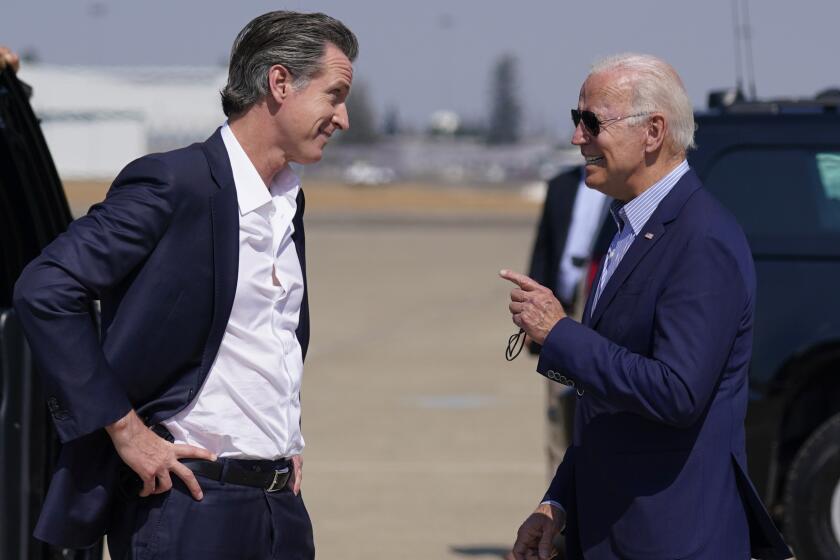Daily Power Call Shapes Political Life of Gray Davis
Every weekday morning at 8:30, members of Gray Davis’ political brain trust reach for their telephones, dial a toll-free number and link up for a conversation that has continued nonstop for years.
On most days the governor joins in, often while puffing away at home on his stationary bike. For the next freewheeling hour, or more, the discussion ranges over the morning news clips, the day ahead and various state issues, all in service of a larger purpose: ensuring that the Democratic incumbent wins a second term in November.
Davis says he views politicking and the need to raise money as one of the necessary burdens of his job, stealing time he would much rather devote to public policy.
But to a far greater degree than either of his recent predecessors, Davis has thrown himself deeply and devotedly into the day-to-day running of his reelection campaign.
He designs TV ads. He dissects poll results. And the whole time he raises huge sums of money, personally asking donors for amounts up to $1 million--a practice that has yielded a bulging bankroll but also exposed him to fierce criticism from Republicans and Democrats alike.
In recent weeks, state legislators and others have criticized contracts struck by the Davis administration with some of the governor’s political donors, including the state prison guards union and Oracle Corp. Both of those deals, as well as a request for a $1-million contribution that Davis made to the California Teachers Assn. in his Capitol office, have deepened questions about the links between politics and policy in his administration.
Other governors have taken a strong interest in political parts of the job. George Deukmejian paid close attention to his portrayal in campaign ads. Pete Wilson called donors in search of large contributions and did as much polling, or more, than Davis. Sometimes Wilson even assigned specific questions to be asked, according to his campaign pollster.
But neither governor waded as hip-deep into his own campaign as Davis, who effectively functions as both the candidate and chief strategist of his reelection effort.
“The governor’s the boss,” said David Doak, the Washington consultant mainly responsible for producing Davis’ TV advertising. “It’s his life. We advise him. He makes the final decision.”
The 8:30 phone call is central to the functioning of the Davis administration, as well as his political team, which has stayed in touch and stayed intact--with the addition of a few key players--since March 1997.
“Almost every decision impacting the state of California, at least from the perspective of the governor’s office, is made on that call,” said one participant, who spoke on condition of anonymity. “It’s the only time you have in one place all the key players he listens to.”
Long-Running Part
of Governor’s Routine
The calls--which cost the Davis campaign as much as $18,000 a month in phone bills--are all the more remarkable for having been held most weekdays, and some weekends, throughout the governor’s term. By comparison, Deukmejian’s campaign team did not convene until January of his reelection year.
But Garry South, Davis’ chief political aide, said there is no end of business that requires daily discussion among the governor and his campaign strategists. “It’s totally specious to suggest that the governor of California, one of the most prominent Democrats in America, doesn’t have ongoing political demands and responsibilities that he has to deal with,” he said.
For that reason, South chose after Davis’ election not to become chief of staff, his job when Davis was lieutenant governor. In fact, South said, none of Davis’ campaign aides are on the public payroll, in contrast to Karl Rove, President Bush’s top political strategist and an important advisor on a host of policy issues.
It is not unusual for elected officials to rely on aides who play both a political and policy role. In Sacramento, Wilson and Deukmejian both had chiefs of staff--Bob White and Steve Merksamer, respectively--who played a vital role in their reelection campaigns.
Nor is it plausible to expect that people who spend years in politics will suddenly stop thinking about such things the moment they go into government. “Obviously, if you watch ‘West Wing,’ you know you don’t just talk about government all the time,” said Larry Thomas, a Republican strategist who served both Wilson and Deukmejian. “You talk about politics and who looks like they’re going to run against you and how you’re doing within your own party.”
But Davis has taken those discussions to a new level by instituting ongoing political bull sessions as an integral part of his administration.
The lineup on the 8:30 call changes regularly, depending on the subject matter and availability of individuals. Some call in while exercising, others while eating breakfast, answering e-mail or surfing the Internet. All use a secret pass code, which changes frequently.
Along with Davis and South, regulars include Doak, the campaign’s ad man, and his partner, Tom O’Donnell; Paul Maslin, the governor’s pollster, and Larry Grisolano, the campaign’s day-to-day overseer. On Tuesdays and Thursdays, the conversation often expands to include Lynn Schenk, the governor’s chief of staff; Susan Kennedy, the deputy chief of staff; and Steve Maviglio, the governor’s press secretary.
The three staffers joined Davis after his November 1998 election. Grisolano signed on last summer. South and Maslin are the governor’s longest-serving campaign aides, helping steer his 1994 run for lieutenant governor. Doak and O’Donnell were hired in March 1997; the daily political call grew out of early getting-to-know-you sessions between Davis’ California and Washington-based strategists.
The arrival of South, Maslin and others marked a major change in Davis’ approach to politicking. For 10 years, while Davis was an assemblyman and state controller, his campaigns had been run by Michael Berman and Carl D’Agostino, the mechanics behind the vaunted Berman-Waxman political machine on Los Angeles’ Westside. Berman and D’Agostino, who demanded utter obedience from their candidates, shunned polling and focus groups and other standard campaign practices. Their strategy was to garner endorsements and raise large sums of money--a practice Davis has continued--then lay on a barrage of last-minute TV advertising and direct mail.
The tactics served Davis well for a time. But Davis and company stumbled badly in the 1992 U.S. Senate primary when they faced former San Francisco Mayor Dianne Feinstein. The campaign produced an ad comparing Feinstein with Leona Helmsley, the New York City hotelier and tax cheat. Davis lost in a landslide and spent years living down the spot. He severed his ties to Berman and D’Agostino and never again wholly trusted someone else’s instincts; indeed, aides say Davis’ attention to campaign detail is a direct result of that disastrous Senate run.
Calls Can Be
Disagreeable
Even so, the 8:30 sessions are robust and not always agreeable, according to half a dozen of those who have participated. “No one is namby-pamby,” South said. “It doesn’t sound like a corporate board meeting. These are all very strong-willed people, starting with the guy at the top.” (Davis has insisted, for instance, that his positive TV spots always include a list of his endorsements scrolling across the screen.)
The candor, aides say, comes from the shared-foxhole experience of four years ago, when few gave Davis much hope of being governor prior to his come-from-behind primary victory. They also share a basic philosophical accord.
“We look at politics essentially through the same prism,” said South, who described Davis as “a buffer between the right-wing instincts of Republicans and the much more liberal instincts of many Democrats in state government.”
The governor declined to be interviewed for this article.
Two key additions to his team are Schenk and Kennedy. Schenk, who served with Davis in Gov. Jerry Brown’s administration, is a former member of Congress from San Diego. Kennedy is a former abortion rights activist and state Democratic Party official, who was also a top advisor to Sen. Feinstein.
The women--who declined to discuss their strategic roles in the campaign--have brought a different set of political antenna, as demonstrated during the recent gubernatorial primary. Davis wanted his team to bloody GOP front-runner Richard Riordan, to check his momentum heading into the November election. But Kennedy and Schenk saw strength in Riordan’s rival, businessman Bill Simon Jr., and that caused Davis and other advisors to rethink their approach.
“We were looking at his mannerisms,” said South, scoffing at Simon’s wooden delivery. “They were listening more to what he was saying and saw his discipline at sticking to that message.”
Convinced by Schenk and Kennedy that Simon could win with a lift from the Davis team, the governor’s strategists poured millions of dollars into anti-Riordan advertising, helping push Simon past the former Los Angeles mayor and giving Davis the November opponent he preferred.
It is just that sort of brute calculation, along with Davis’ ravenous fund-raising, that gives the governor a reputation for placing political preservation above all other thoughts. Republicans, led by Simon, have made that image a central part of their assault on Davis.
Frugal With
Campaign Money
Aides to the governor call the criticism unfair. For one thing, they say, Davis does less polling than people think--and less than some advisors would like. (Insiders gripe that Davis, notoriously frugal in his private life, is just as tight with campaign dollars.)
Maslin, the governor’s pollster, said people underestimate the instincts Davis has developed after nearly 30 years in politics. “He’s extremely smart about the state and its voters and what they’re willing to do and how he can shape that,” Maslin said. “He rarely needs me around, or anyone to tell him, ‘You’re wrong about this’ or ‘Didn’t you realize that?’ ”
He suggested those who fault Davis for being overly political fail to grasp one of the fundamentals of successful leadership.
“Politics is not a bad word,” said Maslin, who has worked for hundreds of campaigns over the last 20 years. “Leadership is a very delicate balance between taking people where you think they ought to go and making sure you can get them there.”
Davis’ campaign advisors help achieve that balance, Maslin said, adding, “What good is policy if ... you can’t get anything done?”
More to Read
Get the L.A. Times Politics newsletter
Deeply reported insights into legislation, politics and policy from Sacramento, Washington and beyond. In your inbox three times per week.
You may occasionally receive promotional content from the Los Angeles Times.







